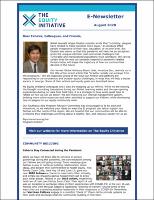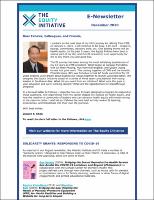Browsing by Subject "COVID-19"
Now showing items 1-11 of 11
-
Access to Healthcare and Social Protection among Migrant Workers in Thailand before and during COVID-19 Era: A Qualitative Study
(2022-03-06)
Thailand is a popular host nation for international migrant workers, particularly those from Cambodia, Lao PDR, and Myanmar. Thailand has introduced approaches to protect their rights for health and social welfare, using various mechanisms over many years. However, the implementation of these policies is dynamic and has been influenced by national security, economic necessity, and public health concerns. The aim of this study was to explore how Thailand designs and implements health and social welfare policies for migrants in Thailand, both before ... -
EI Newsletter: August 2020
(The Equity Initiative, 2020-08) -
EI Newsletter: December 2020
(The Equity Initiative, 2020-12) -
Health Workers on the Political Frontlines
(2022-06) -
Learning from pandemic responses: Informing a resilient and equitable health system recovery in Thailand
(2023-01-25)
This article is part of the Research Topic 'Health Systems Recovery in the Context of COVID-19 and Protracted Conflict'. The third quarter of 2022 saw COVID-19 cases and deaths in Thailand reduced significantly, and high levels of COVID-19 vaccine coverage. COVID-19 was declared an "endemic" disease, and economic activities resumed. This paper reviews pre-pandemic health systems capacity and identifies pandemic response strengths, weaknesses and lessons that guided resilient and equitable health system recovery. Robust health systems and adaptive ... -
Mitigating the impacts of the COVID-19 pandemic on vulnerable populations: Lessons for improving health and social equity
(2023-06-02)
The COVID-19 pandemic had an inequitable and disproportionate impact on vulnerable populations, reversing decades of progress toward healthy populations and poverty alleviation. This study examines various programmatic tools and policy measures used by governments to support vulnerable populations during the pandemic. A comparative case study of 15 countries representing all World Health Organization's regions offers a comprehensive picture of countries with varying income statuses, health system arrangements and COVID-19 public health measures. ... -
Online qualitative research with vulnerable populations in the Philippines: Ethical and methodological challenges during COVID-19
(2023-10-06)
Our article draws on two multi-sited studies to present the ethical and methodological challenges of conducting online qualitative research among vulnerable populations in the Philippines—specifically, among people who use drugs—during the COVID-19 pandemic. While the global scholarship has long articulated the difficulties inherent to pursuing research on such populations, we show how the specific milieu of the Philippines in the last three years has created exceptional, structural challenges to the conduct of said research. Besides the inevitable ... -
Promoting Mental Health During the COVID-19 Pandemic: A Hybrid, Innovative Approach in Malaysia
(2021-10-06)
Background: The COVID-19 pandemic has had monumental effects on the mental health of populations worldwide. Previous research indicated that programs and interventions using social networks can play a positive role in promoting mental health. Nevertheless, current evidence is largely derived from high-income regions, reflecting an urgent need for more studies in low- and middle-income settings. Objectives: This paper aims to (a) describe the potential value of a hybrid health carnival in promoting mental health and increasing access to screening ... -
Socio-demographic and geographic disparities of population-level food insecurity during the COVID-19 pandemic in Thailand
(2023-01-13)
Introduction: This study investigated the prevalence of food insecurity, and the association between socio-demographic and geographic factors and food insecurity in Thailand during the COVID-19 pandemic. Methods: The study extracted data on 5,066 persons age 15 years or older from a nationally-representative sample survey of Thai households, conducted during June-December 2021. The respondents were asked about food insecurity, socio-demographic characteristics, debt, and role of the primary household food provider. Binary logistic regression ... -
Tracking health system performance in times of crisis using routine health data: lessons learned from a multicountry consortium
(2023-01-31)
COVID-19 has prompted the use of readily available administrative data to track health system performance in times of crisis and to monitor disruptions in essential healthcare services. In this commentary we describe our experience working with these data and lessons learned across countries. Since April 2020, the Quality Evidence for Health System Transformation (QuEST) network has used administrative data and routine health information systems (RHIS) to assess health system performance during COVID-19 in Chile, Ethiopia, Ghana, Haiti, Lao ... -
Utilisation of and factors associated with non-COVID-19 healthcare services in public facilities amongst cross-border migrants in Thailand, 2019-2022
(2024-01-09)
Background: It is believed that the COVID-19 pandemic might disrupt routine healthcare services. A vulnerable group such as cross-border migrants is of critical concern if the pandemic affects their service utilisation. In this study, we aim to explore the impact of COVID-19 and other related factors on non-COVID-19 service amongst cross-border migrants in Thailand. Methods: We conducted an ecological time-series cross-sectional analysis using secondary data from 2019 to 2022, focusing on insured and non-insured migrants in a unit of a provincial ...










